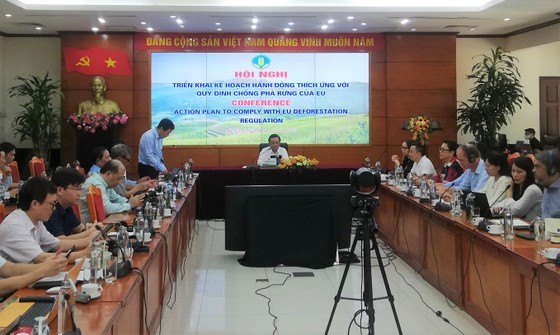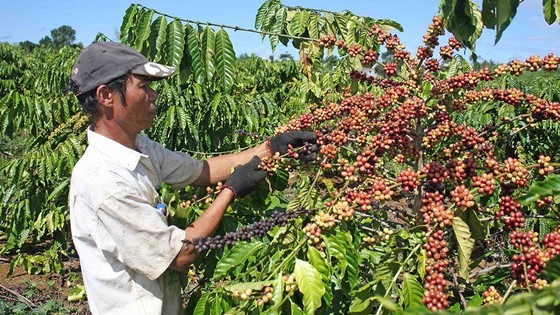 |
At the conference |
Yesterday afternoon, in Hanoi, Minister of Agriculture and Rural Development Le Minh Hoan chaired the conference on deploying the action plan to adapt to the European Union Regulation on Deforestation-free Products (EUDR).
Before the seafood industry's IUU yellow card" was removed, Vietnamese business exporters fretted that their goods to the EU were at risk of being labeled as high-risk goods if they did not comply well with the EUDR which aims to minimize the risk of commodities and products associated with deforestation being placed on the EU market or exported.
The EU deforestation regulation (EUDR) aims to prevent commodities associated with deforestation from entering the EU market. The EUDR covers imports of various commodities, including cocoa, coffee, palm oil, and rubber, plus products derived from them, such as chocolate, tires, and shoes.
If the seven commodities - cattle, cocoa, coffee, palm oil, rubber, soy and wood items come from land that was deforested after Dec. 31, 2020, they will be banned from import into this market.
Based on investigative evidence and information collected on the relationship between goods and the risk of deforestation, the European Commission’s EUDR will reflect numerous factors including the risk category of the country of production such as high risk, standard risk, or low risk.
 |
Coffee exports may be banned into the EU under the new regulation |
Accordingly, the EU will apply the above criteria to "label" countries or production regions within that country before the final decision is December 30, 2024. According to Managing Director of Forest Trends' Forest Policy, Trade, and Finance Initiative To Xuan Phuc, Vietnam will be in a disadvantageous position if the EU takes the product with the highest risk of deforestation as the basis for national risk labeling.
At the conference on the afternoon of November 4, representatives of authorities, associations and businesses said that the biggest difficulty that agricultural supply chains in Vietnam are facing when meeting new EU regulations is a database to locate forest areas, trace origin, and deploy an anti-deforestation monitoring system.
Because the preparation time until this regulation begins to apply is less than 18 months, it is necessary to urgently review products in the most risky areas in the agricultural supply chain, especially the smallholder sector. Accordingly, there needs to be a plan to collect and process information from millions of farming households according to new regulations on anti-deforestation.
Minister Le Minh Hoan determined that this is an opportunity to restructure industries related to forests and forestry economics such as coffee, rubber, wood and products processed from wood. Working to end deforestation and forest degradation is not only an EU regulation but a world trend in green growth towards a transparent, responsible and sustainable economy and agriculture.
Minister Le Minh Hoan encouraged industry associations to proactively prepare and implement the new changes though these changes bring difficulties. Without preparation for new changes, businesses will face more barriers, he said.
























